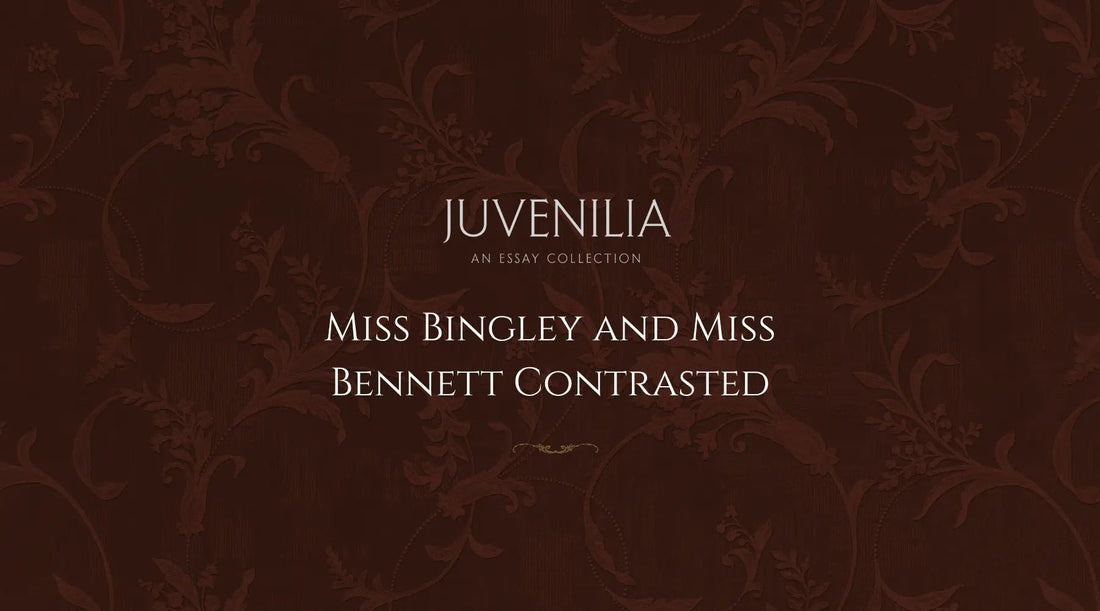
Miss Bingley and Miss Bennett Contrasted
The passage concerning Miss Bingley's inability to sit put and read is significant because it perfectly illustrates the reason why Mr. Darcy ends up with Miss Bennett over Miss Bingley. Miss Bingley and Miss Bennett are two sides of the same coin and are opposites in all ways apart from gender. The drive of each of the women is dissimilar as is their respective classes and temperaments. It is in these differences that we see Elizabeth come to be the object of Mr. Darcy's affection as opposed to Miss Bingley's, whom he was well acquainted to begin with.
"It is a truth universally acknowledged that a single man in possession of a good fortune must be in want of a wife (Austin 1)."
This quote is integral to the entire plot, but is very subversive in its meaning, because—as with Miss Bennet and Miss Bingley being two sides of the same coin—the quote can also mean the opposite, that a woman must be in want of a rich, established husband; this again puts both women at odds as this is true for Miss Bingley, but not for Miss Bennet.
Miss Bennet is driven by her intellect whereas Miss Bingley is driven by values materialistic in nature. We see this in action when Miss Bennet turns down Mr. Collins' marriage proposal. Elizabeth rejects him on the grounds that they would be a terrible match, and she therefore didn't want to be subject to needless suffering. She turns down the marriage proposal even though he is the one who will inherit all of her family's wealth and estate. If she were driven by wealth, she would have accepted the marriage proposal on these grounds alone. Instead, she declines and finds contentment elsewhere on her own.
Miss Bingley, on the other hand is aghast to see Miss Bennet walk as opposed to use a buggy. Miss Bennet, upon arriving at the Bingley residence, is described as being disheveled with dirty stockings and a red face from exertion (27). Miss Bingley and Mrs. Hurst gossip about it when Elizabeth takes leave to see Jane, but the men see no issue with it and seemed to be humoured by it instead. The women are very judgmental and think Elizabeth wild, unladylike, conceited, independent to a fault, and disruptive to norms.
Miss Bingley is from a rich, reputable family and is educated in the arts. She can paint, sing, dance, and play an instrument, a sentiment that is repeatedly stated is of the utmost importance for a woman of standing to possess. She is topically superior to Miss Bennet in every way, but it's still not enough to win Mr. Darcy over. She is a cookie-cutter figure of what a woman "should" be, an idealized version of the real thing. Miss Bingley is not genuine. In fact, by Elizabeth, she is described as being judgmental and conceited when she and Jane spoke after the first party (11).
Miss Bingley does not go beyond even the lowest standards of courtesy and comes off as standoffish and nose-up. Miss Bingley has all of the things that supposedly make a woman interesting and upstanding, but when in the room with Elizabeth and Mr. Darcy, she cannot stand to simply sit and read, and instead grabs a book to impress Mr. Darcy... who obviously sees right through this. She grabs a book for the approval of others, struggles to be interested in it and thus pretends to read it, only to interrupt those around her who truly do wish to read.
She is very inconsiderate, desperate, and insecure in her decisions. She cannot think for herself and relies on what society thinks to dictate how she behaves and how she thinks. Adding insult to injury, she then speaks about how her life would be in ruins if—when married—she did not have a household library. It is safe to say that when she mentions marriage, it is obvious her affections are with Mr. Darcy, though every time she speaks with Mr. Darcy, it is a one-sided conversation where Mr. Darcy listens with indifference (22).
In contrast, Miss Bennet comes from a family whose reputation is nearly ruined several times on the account of Mrs. Bennet, and the three youngest daughters. In addition, her family did not have the financial means to provide formal teachers and instead, Mrs. Bennet taught them herself. Elizabeth had a modest upbringing and will have no wealth given that Mr. Collins will inherit the family estate.
She is intelligent in her own right without the aid of a teacher and with modest musical abilities at best, but despite this, it is she that ends up with Mr. Darcy, even over his own betrothed. In her non-conformity, she secures herself the rich husband, but not through actively searching for the wealthiest man. Instead, she secures him over time through conversation and understanding, something Miss Bingley could never do despite having known him for years. In fact, the two seemed quite uninterested in each other for the majority of the novel. Elizabeth rejects his dance (21), and his marriage proposal (163) and does not make herself readily available to him.
In contrast, Miss Bingley throws herself at Mr. Darcy at every opportunity (21, 22, 28, 39, 44.) Elizabeth is unapologetically herself. She has a nonchalant, carefree attitude about her, that, while it gets her into trouble at times, is usually to her benefit even though her actions and outspokenness are contrary to societal norms, and Mr. Darcy takes note of it. He is drawn to her despite having said she was not handsome or intriguing enough to dance with at the party (8) because to him, conformity is expected and conforming. She is interesting and different.
In conclusion, the passage tackles the compartmentalizing of gender roles, particularly in women. In Miss Bingley, we see an upstanding woman with a rich, established family and an excellent reputation, and she believes in societal norms and a particular etiquette. In Miss Bennet, we see a middle-class woman with modest means and a not so reputable family background. She is wild and non-conforming to an extent, and she does not put a great deal of concern in impressing others. Though the passage in question is very early in the book, and the circumstances have not yet unfolded, the scene is indicative of why Mr. Darcy ends up with Elizabeth instead.
Conformity assumes that everyone is looking for the same thing, which is a preposterous notion. If Mr. Darcy and Miss Bingley were to have married, the relationship would have looked very similar to Mr. and Mrs. Bennet, an unhappy marriage where the husband finds the wife tiresome and foolish. The fact that Miss Bingley believes her ability to sing, dance, and play the piano alone will gain her a husband alone, in retrospect, is a little laughable. Mr. Darcy falls for Elizabeth because she does not make herself too available, she does not care to do things she does not wish to do, and she is captivating in her eccentricity and thus the relationship would not be boring.
[WORKS CITED]
Austin, Jane. Pride and Prejudice. Bantam Classic ed., Bantam Dell, 2003
